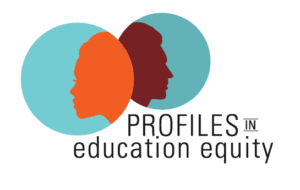Profile in Education Equity: Devin Morris, Cofounder and Executive Director of The Teachers’ Lounge
Devin Morris co-founded The Teachers’ Lounge in 2018 in Boston with then-business partner Jabari Peddie. They began this work because throughout their own K-12 and college experiences, as well as in their professional careers, they witnessed the under-representation of educators of color in lead teaching positions and felt the effects of not having a teacher with whom they could identify. Together, they sought to change this reality for future generations of students by creating spaces intended to increase the recruitment, revitalization, and retention of educators of color across the greater Boston area. According to Ed Trust’s Teacher Diversity Scan tool, 99% of Black students in Boston attend a school where at least 5% of the teachers are of the same race.
work because throughout their own K-12 and college experiences, as well as in their professional careers, they witnessed the under-representation of educators of color in lead teaching positions and felt the effects of not having a teacher with whom they could identify. Together, they sought to change this reality for future generations of students by creating spaces intended to increase the recruitment, revitalization, and retention of educators of color across the greater Boston area. According to Ed Trust’s Teacher Diversity Scan tool, 99% of Black students in Boston attend a school where at least 5% of the teachers are of the same race.
After earning his marketing degree from Boston College, Devin gained over five years of experience in footwear design and product development before receiving an MBA from Babson College, where he focused on social entrepreneurship and a rediscovered his passion for education. Now, after nearly 15 years in education, Devin has held roles in teaching, coaching, mentoring, school leadership, student/staff recruitment and retention, marketing, and development in district, charter, and private schools in New York City and the greater Boston area. Devin sits on several local and national coalitions supporting the diversification of the teacher workforce in support of all students.
What does education equity mean to you?
Education equity means, while we ensure ALL students have access to opportunities to learn and, they each also have access to the specific level of support, tools, and resources they need to succeed.
Define how you advance education equity in and around Boston?
The Teachers’ Lounge intentionally works at the intersection of individual, school-based, and governmental action to amplify our actions to build a more equitable and just education system. We develop and implement solutions for building more diverse, equitable, and inclusive learning and professional environments for all stakeholders. In our specific work context, the “support, tools, and resources” are a diverse educator workforce. More specifically, we focus on the following:
- Community Cultivation: Educators of color from across the Commonwealth join a community that affirms the rich diversity of experiences and backgrounds rarely reflected in our schools, at present.
- Learning and Development: Educators of color take part in our monthly panels, workshops, and professional development programming to improve individual and collective practice. Schools, organizations, and community partners are supported in developing and implementing equity-centered hiring and retention strategies.
- Sustainability & Growth: Through our Classroom Leaders of Color (CLOC) Fellowship, we provide continued support, coaching, mentorship, and resources to address the specific needs of early career educators of color.
- Representative Research: We engage in research, analysis, consultation, and synthesis of information, rooted in the lived experiences of educators of color, to produce thoughts, ideas, and practical approaches to promoting equity in our education system.
- Career Advancement & Mobility: Educators of color connect with other educators of color and hiring managers to gain access to new resources and opportunities. Hiring managers are connected to a diverse collective of educators of color across 10 months of programming, allowing opportunities to develop sustainable relationships. Candidates and hiring managers gain access to a job portal and virtual hiring fair.
What is your organization’s greatest challenge?
National research shows that educators of color are leaving the profession at a rate 24% greater than their White counterparts. Our research has shown that educators of color are leaving the field at higher clips before Year Four, a phenomenon we call The Year Four Falloff. In addition to issues related to the invisible tax of being an educator of color teaching students of color, a lack of trust in or conflict with leadership, and inadequate compensation, our studies have also shown that early career teachers who graduate from teacher prep programs (TPPs) stop receiving support and coaching after their two years of service are up. Many schools are also not equipped to provide the specific supports, coaching, and resources necessary to support early career educators of color.
The result of this “falloff phenomenon” greatly impacts student achievement. On average, in schools serving the greatest percentages of Black students, for example, 15% of teachers are novice teachers. In schools serving the smallest percentages of Black students, 10% of the teachers are novice teachers. But in many states, the disparity is much greater. In fact, in 1 in 4 states, schools serving the greatest percentages of Black students have at least twice the percentage of novice teachers as schools serving the fewest.
That’s why the Teachers’ Lounge Classroom Leaders of Color Fellowship will provide a local cohort of K-12 educators of color with a learning network of peers, coaches, and mentors of color, to collaboratively meet their specific needs, while developing, maintaining and improving the skills needed to serve all students. Our two-year cohort model equips fellows with the tools, resources, and support to navigate the increased demands of a post-pandemic education system, improve their skills, well-being, self-advocacy, leadership, and sustainability as classroom leaders into the next school year and beyond.
